Side Menu:
Chief Purser Hugh McElroy
- 1899 White Star Line
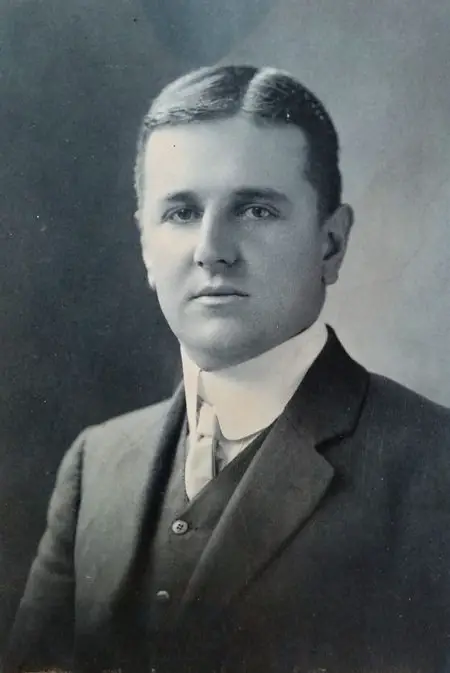
McElroy in an undated studio photograph.
(Courtesy of Joan O'Brien)
John Ellis, the Passenger Manager of the Allan Line in Liverpool, introduced McElroy to Bruce Ismay in 1898, leading to McElroy joining the White Star Line in 1899.
"John Ellis knew and respected Bruce Ismay quite well, Hugh had been introduced to Bruce Ismay in 1898, by way of John Ellis, and in 1899 Hugh was offered the job of Purser with the White Star Line and was told to report to their Liverpool Office for induction into the company, his record of service with the Allen Line [sic] held him in good stead for those first few months."" ("The Life and Times of Hugh Walter McElroy, Chief Purser of R.M.S. Titanic"," by Frank McElroy).
According the McElroy's White Star records, he was officially appointed to Purser on "July 20 1899 Cymric New York" - with an additional detail that he was introduced by John Ellis of "19 James Street". He was living at 17 Central Park Avenue, Liverpool at the time of his appointment.
1899 - 1900 Cymric
The SS Cymric had started its service the year before in 1898 and operated on the White Star Line's main passenger service between Liverpool and New York. She was capable of carrying 1,418 passengers; 258 in First Class and 1,160 in Third Class.
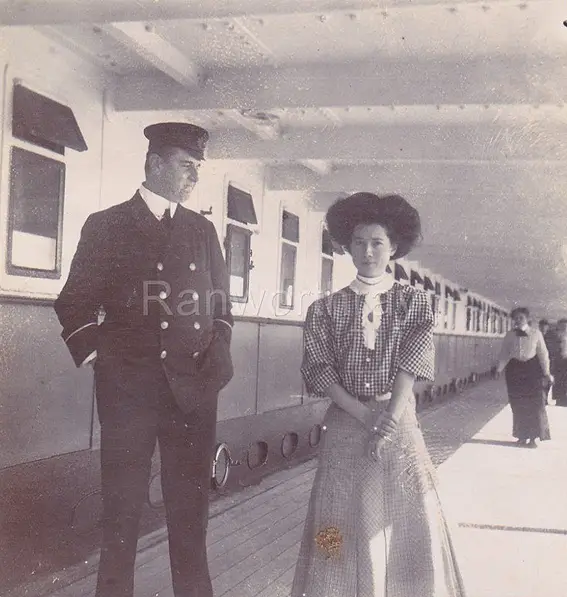
A circa 1901 photograph of Hugh McElroy on board the Cymric in his new role as Purser, with an unidentified passenger. (Click image to enlarge)
McElroy's first ship at the White Star Line was one that would play a role in other Titanic officer's lives. Charles Lightoller was Second Officer aboard Cymric from 25th January 1902 until May 1903. Henry Wilde worked aboard the Cymric from March to April 1909 as Chief Officer.
McElroy appears in the S S Cymric's "Particulars of Engagement" dated the 28th July 1899, the first recorded mention of him on a White Star ship. On line 113 it reads "Hugh McElroy (Purser)" aged 24, from Liverpool and his address 17 Central Park Avenue, Liscard (Wallasey, Liverpool). His monthly salary was £10, compared to the stewards who were on £3. Notably it mentions that the Sardinian was his previous ship, which confirms that the Cymric was his first White Star ship.
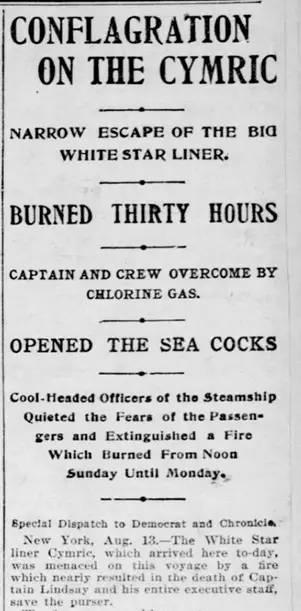
14th of August 1900 Democrat and Chronicle
newspaper about McElroy and the fire aboard the
Cymric. (Click to enlarge)
He later appears in the Cymric's 7th of September 1900 Particulars of Engagement, with his address changed to 6 Willow Street, Liscard (Wallasey, Liverpool), and once again on the 12th October 1900.
His time aboard the Cymric was not without drama. According to the 14th of August 1900 Democrat and Chronicle (Rochester, New York) newspaper report, there was a "Conflagration on the Cymric" that burned for thirty hours which resulted in the "Captain and Crew overcome by chlorine gas". The fire started on Suday the 5th of August 1900 when they were 24 hours out from Queenstown and was caused by "spontaneous combustion in the straw used to pack a crate of fine pottery in the lower hold." McElroy is mentioned in the newspaper report with Captain Lindsay responding to the fire by instructing "Tell Mr Mc.Elroy, the purser, to stay by the passengers." There were 125 passengers aboard that McElroy was looking after. Once the fire was out the passengers praised the "coolness and bravery of the officers and crew."
Interestingly, the chief officer aboard the Cymric and who responded to the fire along with the Captain, was Joseph Evans, who would later become the chief officer of the Olympic in 1911, prior to Henry Wilde taking his place.
In an undated newspaper article courtest of Joan O'Brien, McElroy is also listed as having worked aboard the Germanic prior to the Britannic - although if this is accurate is yet to be verified.
1900 HMT Britannic
According to Frank McElroy, Hugh McElroy's next ship at the White Star Line was the "the troopship S.S. Britannic, during the Boer War, which carried some 37,000 troops to Africa, Hugh worked aboard S.S. Britannic with Captain Hayes who was then the commodore of the White Star Line." ("The Life and Times of Hugh Walter McElroy, Chief Purser of R.M.S. Titanic,"" by Frank McElroy). Built in 1874 the SS Britannic was the first of three ships of the White Star Line to sail with Britannic name. A single screw passenger steamship she also had auxiliary sails, and was rigged as a four masted barque and built to carry a total of 1720 passengers in two classes and 1500 steerage passengers.
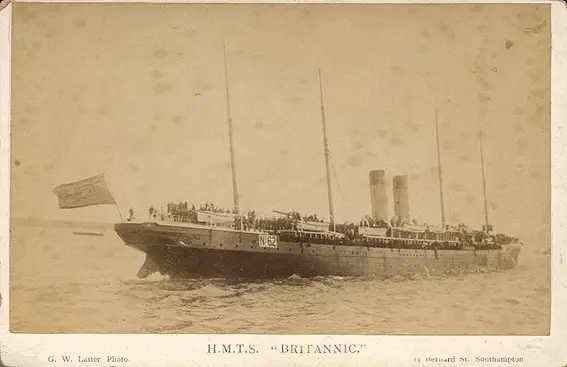
HMT Britannic (Source: greatships.net)
The Britannic made her final transatlantic voyage for White Star in August 1899, and then was requisitioned by the Royal Navy and converted for use as a troopship to transport soldiers to the Second Boer War in South Africa, gaining the designation HMT (Hired Military Transport) #62.
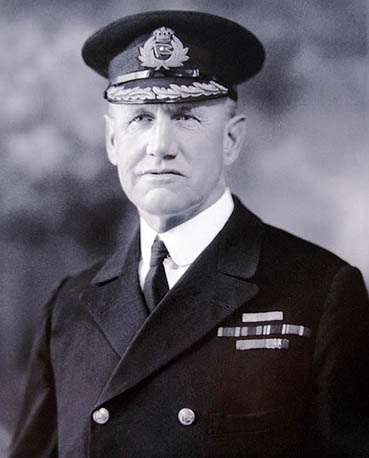
Captain Betram Fox Hayes.
The Captain of the Britannic was Betram Fox Hayes who himself had just joined the White Star Line in 1898 and taken command of the Britannic in 1899.
Hayes wrote in his autobiography entitled "Hull Down; Reminiscences of Windjammers, Troops and Travellers" (1925), that he and the purser had discussed their change in roles now that that they were accommodating troops instead of paying passengers. Hayes and the purser "held a consultation. We had, in fact, spent many evenings together studying the transport regulations to find out exactly how we stood regarding our relations with the officer commanding the troops." When they arrived in South Africa it was the purser who requested fresh milk and also negotiated to ensure the troops did not leave negative comments in their "voyage reports." Hayes explains that " Purser would see the Adjutant and talk about the papers, and the hurry of disembarkation, etc., and then would suggest that he should have the reports ready two or three days before we arrived, leaving the dates blank so that they could be filled in at the last moment. They always agreed to do this as the Purser was an adept at persuading people that what was easiest for him was best for them. Then as soon as they were completed he would bring them up to my room and we would go through them together; it was only on two occasions that we found anything we wanted altering, and in each case we managed to get what we wanted." ("Hull Down; Reminiscences of Windjammers, Troops and Travellers" 1925, Betram Fox Hayes)
The role of purser also involved defending the ship. Hayes recalls a Transport Officer discussing the Britannic with "my Purser, he said : 'She would have been paid off twelve months ago if I had had my way,' and the Purser answered : 'I don't see why. We keep good time, have fewer deaths than nine out of ten of the other transports, and we never have any complaints.' ” ("Hull Down; Reminiscences of Windjammers, Troops and Travellers" 1925, Betram Fox Hayes)
Baden-Powell - the Parrot
It was during his time aboard the Britannic that McElroy met "Baden-Powell" a "wonderfully intelligent... big white Australian parrot." (The New York Times, 4 May 1903). McElroy apparently spotted the parrot in Cape Town aboard a visiting tramp steamship carrying petroleum and was taken with the bird's sense of humour. The bird's owner, a junior officer, was at first reluctant to part with the parrot but "McElroy worked on the officer's patriotism by telling him what a joy the bird would be to the thousands of soldiers who were destined to Journey to and from England on the Britannic." The junior officer relented on the condition that the bird was renamed from Petroleum Pete to the name "Baden-Powell." McElroy and his new parrot would become something of a celebrity aboard subsequent ships.
The Cedric's Parrot Mascot
"Baden-Powell " Won Purser McEIroy's Heart by Bighting a "Landlubber Off the Starboard."
Not since the days of Funston, the famous Mexican parrot of Castle William on Governors Island, has there been seen In these parts a bird so wonderfully Intelligent as is "Baden-Powell, the big white Australian parrot whose home is on the White Star liner Cedric. The other day, when the Cedric sailed out of New York, bound for Liverpool, there stood at the. rail waving farewell to friends ashore a big, well-built Scotchman named McElroy and on his shoulder, there perched a great white parrot. McElroy is the Cedric's purser, and Baden-Powell is his ward.
Purser McElroy, was for several years past acting as purser on the White Star liner Britannic, one of the vessels of that line's fleet requisitioned Into service by the British Government as a transport for the South African service. It was just after the Britannic became a military transport that McElroy ran across Baden- Powell. The bird arrived in Cape Town one day on a tramp steamship. McElroy was strolling along the docks when suddenly the air was rent with the cry, "Land lubber off the starboard!" McElroy looked around and he caught the eye of the parrot, and then the feather wonder piped, "He's rubbered."
Right then and there McElroy made up his mind to secure the bird, and going on board he inquired for the owner. He was escorted to the cabin of one of the Junior officers, who pleaded guilty to owning the bird.
"I want him, and just simply have got to have him," was the way the Britannic'a purser opened negotiations.
"Sorry, but you can't have him," was the laconic refusal of the owner.
Then McElroy worked on the officer's patriotism by telling him what a joy the bird would be to the thousands of soldiers who were destined to Journey to and from England on the Britannic.
"All right," answered the owner of the bird. "I will let you have him on one condition. His name now is Petroleum Pete, since petroleum is what we carry principally, and I don't like the name. You must call him Baden-Powell."
The bargain 'was concluded, Petroleum Pete was rechristened according to contract, and an hour later was safely caged away In McEIroy's cabin aboard the Britannic.
When the Cedric arrived at New York on her last trip Baden-Powell was not on deck when the big liner was berthed. Neither was his guardian. When found he was perched on McElrov's shoulder, the officer being busy in his office getting his papers 'ready to be turned over to the proper officials. An acquaintance of McEIroy's knocked at the door.
"Keep out. No lobsters wanted", was what the knocker on the outside heard from within.
"Shut. up Baden! Come in. It's all right," answered McElroy, and the friend opened the door. " McElroy greeted his friend warmly, while Baden-Powell, with a look of disdain on his peaked countenance, eyed him critically.
"Bum looker: don't cut much ice." piped the parrot.
McElroy told the bird to shut up. where upon Baden-Powell gave a loud "All right, all righ." and. leaving his place on McEIroy's shoulder.- took up his position on the windowsill overlooking the grand stairway ...
" Look out. Mac; the old man's coming! said Baden-PowelL
"I told you to shut up", retorted the purser.
"All right." answered Baden-Powell, and he obeyed orders.
(The New York Times, 4 May 1903).
1900 - 1902 The Majestic
In 1901 McElroy and his family appear on the 1901 census as living at 6 Wilton Street, Liscard, Cheshire, where they had moved the previous year, and Hugh was described as a ship's purser. Indeed he was now purser aboard the Majestic.
According to Frank McElroy, Hugh McElroy served "later under Captain E. J. Smith" during the Boer War which would mean he may have worked onboard the second of Smith's trips to South Africa aboard the Majestic in February 1900, which was reportedly without incident.
McElroy served with Captain Hayes aboard the Majestic between 1901 and 1902 and Hayes recalled several anecdotes involving "my tactful Purser." in his autobiography, most likely dating to this period (although McElroy also served with Hayes 1906-1907 aboard the Majestic) Hayes wrote:
An amusing incident of this kind happened when I was in the first Majestic , and the situation was saved by my tactful Purser . The gentleman' s card was inscribed “ Ambassador Extraordinary and Minister Plenipotentiary to the Court of - , " so his standing and importance were unquestionable and he was fully aware of it . On embarking at Liverpool he found he was berthed “ below decks , " as he called it , and that the best rooms were all occupied by “ Drummers , sir … I ' m not accustomed to travelling below decks . ”… To impress his importance on the Purser , he said , “ I usually travel in cruisers , sir , ” and McElroy replied : “ And very uncomfortable ships they are , sir." This broke the ice , as it were , and after further conversation he was promised a seat in the dining - saloon next to a very charming actress who happened to be a passenger and in whom he appeared to be specially interested . She very kindly fell in with the arrangement … This reminds me of another story that happened in the same ship , and in which the same Purser was concerned . Another of our steamers had been chartered for a Mediterranean cruise by an American tourist agency . The cruise was disbanded on the steamer ' s arrival at Liverpool and a number of the cruisers were returning to New York with us . The charterer came on board while we were embarking our passengers at the stage and went to the Purser ' s office . “ You don't know me, Mr .Purser - I don ' t know you ," he announced . “ My name is - You have some of my cruisers on board , and they will all come to you and say I promised them all sorts of things . Well , I haven ' t promised a damned one of them anything , so don't give them anything , and , what's more , I don't care if I never see anything of any of them again There are sixty-four million people in the United States , and if I can't get eight hundred suckers out of that number every year I don ' t know my business . ” Of course , everything was done , in spite of his remarks , to make them as comfortable as possible while they were with us , as steamship owners are not in the happy position of being able to treat prospective passengers in the same airy manner that he evidently considered he could . ("Hull Down; Reminiscences of Windjammers, Troops and Travellers" 1925, Betram Fox Hayes)
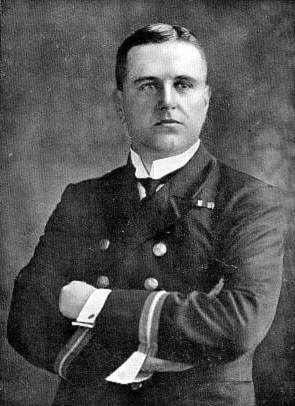
Hugh McElroy in Purser’s uniform, showing the
ribbon for the Transport Medal with the South
African clasp, in 1909.
1903 Medal
McElroy's time working aboard the Britannic and Majestic during the Boer War led to recognition - he was mentioned in the “Boer War Transport Medal Roll” book, while serving aboard the Britannic. He was awarded the “Transport Medal” which was presented on the 1st of December 1903, by the Director of Transport, This medal was awarded to Pursers 'whose position and services specially deserved'.
Hugh can be seen in several photographs wearing his Transport medal.